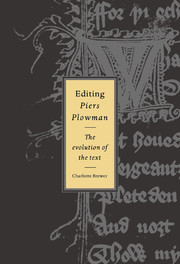Book contents
- Frontmatter
- Contents
- Acknowledgements
- Abbreviations
- Note on the texts
- Introduction
- Part I The early phase
- Part II The late nineteenth century
- Part III The Skeat aftermath
- 10 Manly versus Chambers and Grattan
- 11 Excursus: Westcott and Hort
- Part IV Chambers and Grattan, Knott and Fowler
- Part V The Athlone Press edition
- Part VI Epilogue: the Athlone aftermath: Schmidt, Pearsall, Rigg-Brewer, et al.
- Works cited
- General index
- Index of manuscripts
- CAMBRIDGE STUDIES IN MEDIEVAL LITERATURE
11 - Excursus: Westcott and Hort
Published online by Cambridge University Press: 20 August 2009
- Frontmatter
- Contents
- Acknowledgements
- Abbreviations
- Note on the texts
- Introduction
- Part I The early phase
- Part II The late nineteenth century
- Part III The Skeat aftermath
- 10 Manly versus Chambers and Grattan
- 11 Excursus: Westcott and Hort
- Part IV Chambers and Grattan, Knott and Fowler
- Part V The Athlone Press edition
- Part VI Epilogue: the Athlone aftermath: Schmidt, Pearsall, Rigg-Brewer, et al.
- Works cited
- General index
- Index of manuscripts
- CAMBRIDGE STUDIES IN MEDIEVAL LITERATURE
Summary
At this point, it will be helpful to step back and consider some more general issues on the editing of Piers Plowman. The authorship debate was partly fuelled by the perception of differences between A and B. For a number of reasons, there is strong psychological resistance to the possibility of variation in a canonical text. In the years following Manly's bombshell, advocates of single authorship felt the need to argue that the differences Manly perceived between A and B did not exist (as in the cases of dialectal or alliterative distinctions), or that they were not significant, or that they were due to faulty scribal copying preserved in Skeat's edition. Manly and his followers explained the differences by positing more than one author, and suggesting scribal disruption of A, thus assigning to other hands all the major flaws which were perceived to exist in the canonical text.
There also exists an accompanying resistance to the notion that the author may have changed his mind. He would presumably have done so for some reason, the most obvious being that he regarded his first version as unsatisfactory. But to admit this necessitates admitting also that not all of the author's writings were of the same high quality – an admission which many critics seem to find intolerable, when an alternative explanation is at hand, viz. attributing the variation to scribal corruption.
- Type
- Chapter
- Information
- Editing Piers PlowmanThe Evolution of the Text, pp. 209 - 216Publisher: Cambridge University PressPrint publication year: 1996

